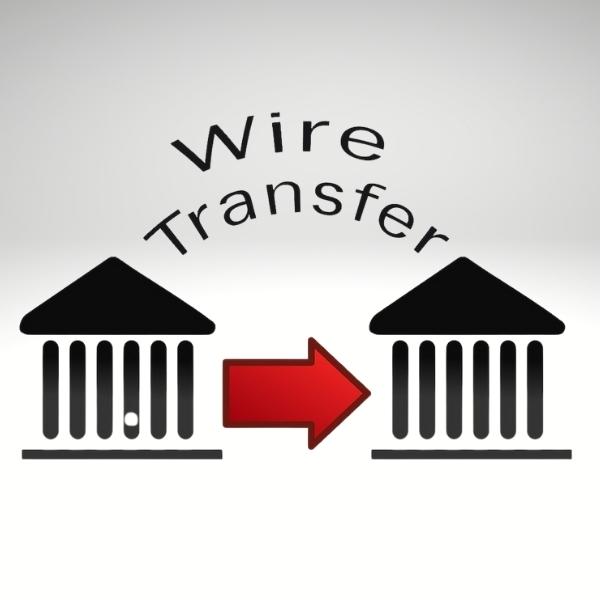
Wire Transfers
Section Menu
What is a Wire Transfer?
A wire transfer is the electronic transfer of funds between individual or business accounts. Wire transfers allow people in distant locations around the globe to safely transfer money across geographical locations. Wire transfers can be domestic (sent between accounts within the same country) or international (sent to a bank account that is based in another country).
The person initiating the transaction, known as the remitter, provides all the instructions for the transfer, including:
- Beneficiary’s name, account number, and address (street, city, and state; or for international wires, street, city and country).
- Amount of the payment order.
- Execution date of the order.
- Identity of the beneficiary financial institution.
To send a wire transfer through First National Bank, you must be a current First National Bank customer who has a checking, savings or money market account with the bank.
Why customers use wire transfers
 Wire transfers are common for both domestic use in the U.S. and international use. They are popular for international transfers because they are easy to exchange to a foreign currency, if needed.
Wire transfers are common for both domestic use in the U.S. and international use. They are popular for international transfers because they are easy to exchange to a foreign currency, if needed.
They are also a good option if:
- You need to send money quickly and securely. Most domestic transfers are processed on the same day (there is a daily cut-off time). If you are transferring funds to an international account, your account will be debited the same day and First National Bank will send the payment out immediately. The beneficiary’s bank will generally receive the funds 1 to 2 days later. There are factors that could delay the credit to the beneficiary, including: local bank holidays, delays by an intermediary bank or other local conditions.
- If you need an international service. Wire transfers can be sent to persons almost anywhere in the world.
Wire transfer security and safety
Wire transfers are an easy way to send money to individuals and businesses. Compared to putting a check in the mail, wire transfers are considered a safe way to transfer money. They are secure transactions initiated by authorized personnel at First National Bank.
To protect yourself from wire transfer fraud, consumers do need to be hypervigilant about knowing the people to which they are sending funds. Many scam artists try to entice consumers to wire funds instead of mailing a check or using a credit card because wires can’t be canceled or reversed once initiated.
Common wire transfer scams
 Romance scam. You meet someone, typically through an online app or social media site, and begin a relationship. Your online interest starts professing their love for you and then begins to ask for money to help with costs such as medical bills or travel expenses to visit you.
Romance scam. You meet someone, typically through an online app or social media site, and begin a relationship. Your online interest starts professing their love for you and then begins to ask for money to help with costs such as medical bills or travel expenses to visit you.- Family emergency or grandparent scam. You receive an urgent call or email from someone claiming to be a friend or family member who needs money for an emergency. To appear legitimate, they may provide details about your friend or relative, which they have extracted from social media.
- Foreign business/investment scam. You’re introduced to an offer to fund a lucrative investment or business opportunity, usually in another country. You’re directed to act quickly and keep the deal a secret, especially if quested by your bank when sending the wire.
- Real estate scam. With this type of scam, the criminals are targeting people in the closing process of buying or refinancing a home. A scammer gains access to a legitimate email account to impersonate a realtor, attorney, or lender, and then provides fraudulent wiring instructions to funnel your money directly to the scammer’s account.
How to use First National Bank’s Wire Transfer services
- Gather the beneficiary's information. Confirm that the beneficiary/recipient’s information (full name, physical address, contact information, routing number, etc.) is correct. For international wire transfers, you will need to gather the recipient’s SWIFT code. Our wire transfer specialists may be able to assist you identify that code.
- Visit a First National Bank branch location. Wire transfers are a service available to First National Bank customers only. Fees apply. Our wire transfer specialists will assist you the transfer.
- Complete the wire transfer form. A wire transfer specialist with the bank will complete the required wire transfer form using information provided by the remitter. Please note that the Office of Foreign Assets Control (OFAC) prohibits banks from sending wires to specific countries, and foreign financial institutions, individuals, and companies on the OFAC Sanctioned Countries Watch List. Entities included on the OFAC’s list are believed to be a threat to the national security or foreign policy of the United States.
- Familiarize yourself with the fees that apply to your wire transfer before initiating a transaction as the amounts vary depending on the destination.
- Familiarize yourself with the exchange rate. If sending a wire in foreign currency, take note of the exchange rate, which is locked in at the time of a foreign currency transfer.
- Finalize the transfer. Confirm that the information you are providing is correct and pay any applicable transfer processing fee.
- Save your confirmation. Be sure to save the confirmation receipt you receive after submitting your wire transfer request for your records. These receipts may contain important information about your wire transfer, such as the transaction number, total amounts wired, and more.
Wire Transfer Frequently Asked Questions
Below are some of the most frequently asked questions and their answers. If you have a different question, please don't hesitate to contact the bank so that a wire transfer specialist can assist you.
-
-
Can a wire transfer be cancelled?
-
No.
-
-
Can someone wire funds to my First National Bank Account?
-
Yes, someone with your account information can wire funds directly to your First National Bank account. You will need to provide your account number and wire transfer routing number.
Someone sending an incoming international wire to you may also ask for First National Bank’s address. The address to provide for both incoming wires in U.S. dollars is: First National Bank, 405 5th Street, Ames, Iowa 50010
-
-
Can the bank deny a wire transfer?
-
First National Bank has the right to refuse to execute or receive a wire transfer. There are many reasons why the bank may refuse, most of them involve potential fraud. A wire transfer could also be rejected, such as the bank account you are transferring to is closed.
-
-
How do I know if a wire transfer went through?
-
You can contact the bank to track your wire transfer. They will use your Federal Reference number to trace it. The bank will be able to see the transactional details between First National Bank and the corresponding bank into which the funds are being deposited, as well as identify the wire transfer’s current location.
-
-
What is the cut-off time for sending a wire transfer?
-
For same-day domestic wire transfers, funds can only be sent on business days between 9 a.m. and 2:30 p.m. Central Time. If you scheduled a wire transfer to be sent on a future date, you can make changes until 5 p.m. the day before its send date. In either situation, we recommend that you give yourself and the bank’s wire transfer specialist plenty of time to complete the necessary information before the cut-off time.
-
-
Where can I find First National Bank's Routing Number to receive a wire transfer?
-
IMPORTANT. Do not give your account information to anyone, unless you are 100% confident the sender is a trusted individual. Do you know them personally?
If you wish to receive a wire, but don't want to give your account information out, please call 515-232-5561 and ask to speak to the Wire Department.
To receive a wire transfer, you must supply the sender of the wire with the following information:
- your name
- your bank account number
- First National Bank's ABA/Routing Number: 073902274
- Name of the beneficiary Financial Institution (FI): (bank where your money is being wired): First National Bank
- possibly your address
Again, we need to stress that this is a lot of personal information you are giving to someone. Wire fraud is common. We know that fraudsters can apply a lot of pressure on their victims. Therefore, be extremely cautious when providing this level of your personal information to someone. If you have the slightest doubt, please contact the number listed above.